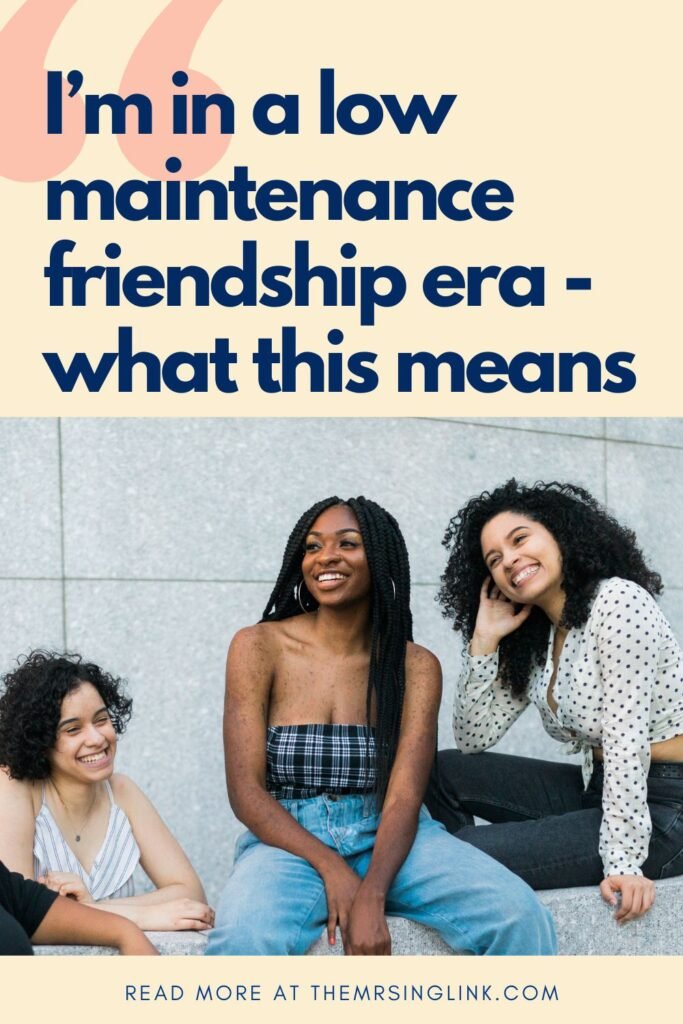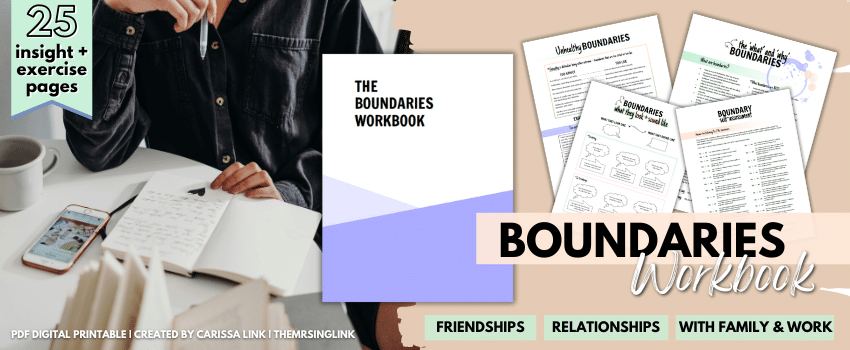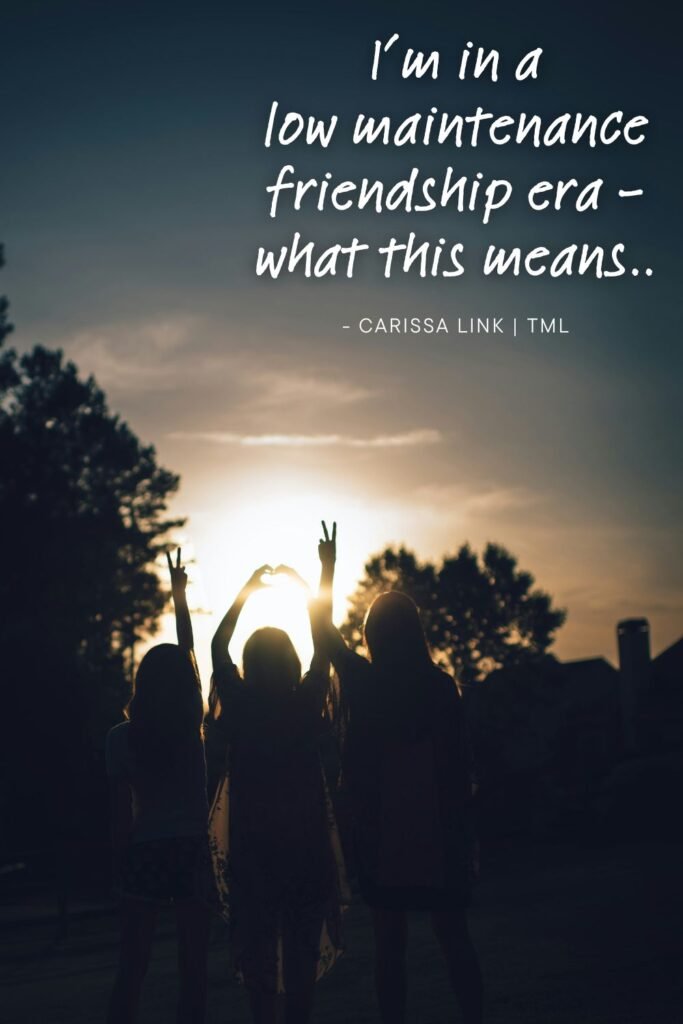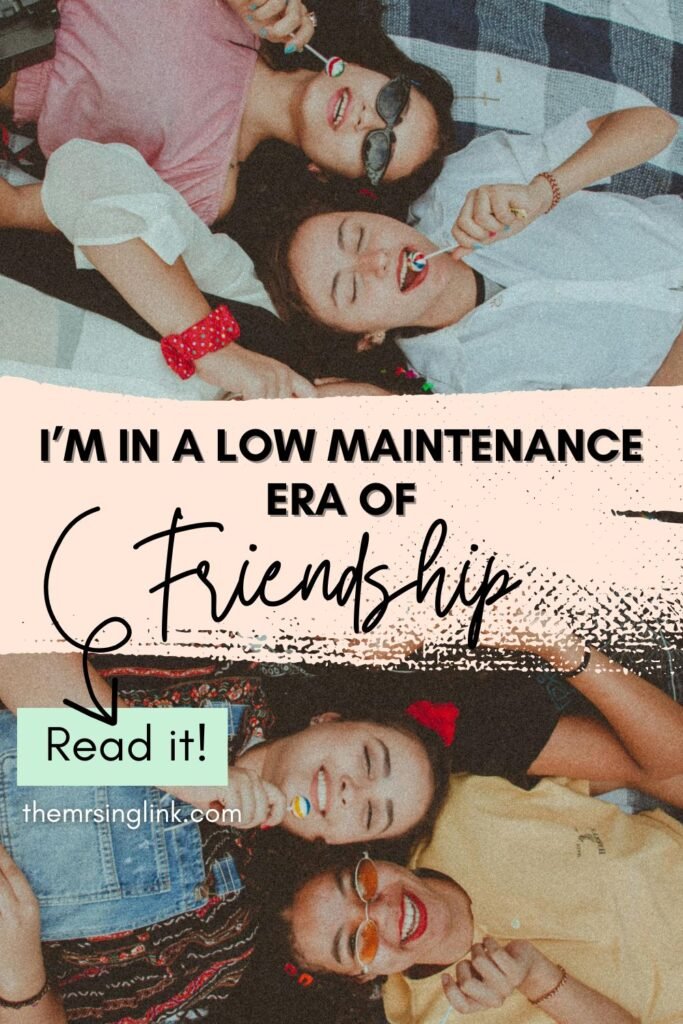Are low maintenance friends always a bad thing?
As I entered my 30’s, I started noticing a bit of a shift. This shift also became more apparent as I grew stronger in my faith, but mainly what seemed to change were my personal ideals for real friendship in life. I couldn’t exactly describe what this shift was about until I stumbled across low maintenance friendship.
Ever since it has clicked for me and now that I have a better understanding, I can explain what this means for me, and maybe this will resonate with you, too.
What we unpack in this post..
Now well into my 30’s, I see friendship differently. Thanks to my husband, (he would consider) he has mostly low maintenance friendships, which has helped me understand their value firsthand. Many may not experience the mindset shift on friendship like I have, but I do think it’s important to address the somewhat negative stigma of what it means to be low maintenance in friendship.
Sidenote: I am loving this era, so don’t feel guilty if you are, too.
What being a low maintenance friend means to me

I’ve unraveled the cultural standard of friendship
Or what’s *trending* as far as friendship goes. And by unraveled I’m talking about deconstructing and dismantling as well. Think about how you would describe today’s cultural standard of friendship, compare how it has changed in the last decade – good and bad – then take note of what doesn’t sit quite right for you.
For me, it is the heavily black and white approach as well as the superficiality of friendship. IMO, today’s cultural standard of friendship is All Or Nothing. On top of that, friendships are surface level to the point they’re nonessential if they are not self-serving; people are blatantly viewed and treated as expendable.
I know you’re probably thinking how low maintenance sounds disposable, when in fact, being low maintenance can mean that I don’t seek to require friendship to support my well-being and to complete my life.
Instead, I view friendships as a privilege instead of an entitlement, which means I am not only choosier about who I befriend but don’t treat friendships as easily replaceable.
I’m minimalizing surface level outlets for connection
Again, what’s a trendy yet very normalized source of connection in friendship these days? Social media. Far too many “friends” utilize social media as a default, convenient and instantaneous way to connect. If low maintenance friendships are going to be hounded for being low effort, we can’t forget to include the Likes and pathological monitoring of Stories on social media.
To me, you’re not actually connecting at all on social media. In fact, I think it’s our brains being tricked into thinking we are when it’s perpetuated entertainment. It’s merely a connection misfire – there’s an initial spark but it lasts .025 seconds. Hence why social media gives us a glimpse into people’s lives without any involvement whatsoever – this is exciting and just satisfying enough. This is what we have been exposed and accustomed to, just enough to spark our dopamine (but only a blip) to the point of addiction.
That being said, there are those who think low maintenance friendship can mean surface level, as stated in the Cons of that post. While I won’t necessarily disagree, I think this point shows that when a friendship’s source of connection and effort stem from surface level outlets, this can definitely contribute to surface level friendship overall. This next post hits the mark – that a hyperconnected and hypercurated online-based society dilutes the quality of our connections and interactions.
Therefore, low maintenance, for me, simply means eliminating the connection falsehood and hyper-convenience that technology’s grip has on our interpersonal relationships. Because if you were to do away with social media right now, today, how many of your friendships would stand the test of time in the real world? Who would actually care to reach out and see how you’re doing when they haven’t seen you post in weeks or months? Honestly.
I respect my space in a connection-obsessed society
In continuation to the point above with texting, social media and simply our mobile devices at our fingertips, we’re hardly disconnected, logged off or shut down. Tell me I’m wrong. This fact has greatly impacted my anxiety surrounding the feeling of constantly needing to make myself available 24/7 to others, whether I’m able or not.
My phone (aka, my internal processing system and battery) is essentially always on charge and on the highest volume setting. God forbid I put it on silent, turn it off for a period of time or allow my battery to die.
The respect for space and disconnect can be so difficult in a culture that is comprised of having access to knowing who is online, when and doing what at all times. It’s hard not to notice that friend who has yet to respond to you as they’re actively online and engaging on social media (aka, peeping your Stories). It’s also difficult to watch a friend who hasn’t invited you out or checked in with you spend their time with other friends.
It’s understandably uncomfortable and complicated, for sure. Newsflash: it isn’t supposed to be like that. Meaning, we’re not meant to have embedded access to people’s time, space and whereabouts.
We have to remember that, regardless, space is space. We can’t control how it’s used. While space certainly doesn’t condone someone to blatantly ignore you for weeks and months on end, when taking a few measly seconds to respond or reach out is next to no effort, it’s the fact we’re now so dependent on and easily affected by hyper-connectivity – feeling so close in access to someone yet so far away at the same time.

How often have we thought someone doesn’t like us, they don’t care as much about the friendship, that we’re not a priority in their life simply because they didn’t respond in the timely manner we anticipated or because they backed out of getting together for the Xth time?
I have, especially when certain behaviors in a hyper-connected world become patterns. For example, if someone texts me “K,” when I’m used to them using “Okay,” or if a friend takes days to respond when they’re known for chronically texting back in a matter of minutes, I will presume they’re feeling something negative toward me. This level of hypervigilance and hyperconnectivity is not okay – it’s not healthy.
Nonetheless, it’s made me sit back and really think about the difference between space and negligence in friendship today, and how we might be confusing the two.
The thing is when I don’t honor and respect my space, I easily get burnt out, which almost guarantees the distance or natural drift that many warn about in low maintenance friendship.
On the flip side, I realize that too much space can be a bad thing, also leading to distance and increasing drift. Others need more or less space than I do, but the fact of the matter is I am much more understanding of this respect for space, and because I too require it, I should be more receiving of that space from others without internalizing it.
Meaning, I no longer want to make it personal if a friend takes more time to respond than I’m emotionally anticipating.
Low maintenance doesn’t have to have this icky connotation as if to justify incessant or bare minimum connection and effort in friendship. High maintenance friendships are very much alive and well in our culture and do their fair share of irrefutable damage. But when the focus is too much on connectivity there’s less respect for space (which is still considered healthy). On the other end, low maintenance also doesn’t mean neglect.
Low maintenance, at this point in my life, means siding more with the benefit of the doubt when it comes to the space of others while also continuing to honor my own.

Quantity means nothing at the expense of quality
It’s true, low maintenance can mean having far and few friends, and many are A-okay with that. In fact, they embrace it. Or there are those who, like my husband, say they have many friends (no exaggeration here) but only a handful of actual good, close friends. Yet he’ll label someone he knew from elementary school, and hasn’t spoken to in over a decade, a friend. Low maintenance can still mean knowing and having many connections without the expectation for deeper, stronger connections.
The real question is when quality is at the expense of quantity, because low maintenance still typically says I don’t want or need fake, forced and low-quality connections.
In friendship culture, it’s still the in thing or goal to have a ton of friends as a measure of success, likeableness and popularity. We can’t deny this isn’t true. Yet so many under wraps will say they’re lucky to have a couple solid, good friends. Some even say they genuinely feel like they know many people but that they don’t have any friends at all.
First of all, I think we ought to do better against shunning the idea of going through transitional phases in life without many friends. As someone going through that phase, it has truly opened my eyes to the meaning of quality over quantity.
Above all, quality can’t be forced. To be in a low maintenance period means that while I am open to friendships, it’s not to simply have them. Quality being numero uno, being low maintenance means I am willing to be patient and move at a much slower, gradual, gentler pace. I put forth effort where and when it matters, even if that doesn’t equate to a level of Love-bombing attention. Yes, friendships can experience Love-bombing, too. Like we often reiterate in healthy relationships – they are a slow burn, not a forest fire.
My personal lifestyle has changed overall compared to in my 20s
When we consider low maintenance friendship, do we factor in things like interests, personality changes, and lifestyle? What does this mean exactly?
For starters, when I was in my late teens and early 20s, all I wanted to do was party (shocker). I was ambitious for getting out, being seen, showing off, and checking off lists – let’s be real, here. I was very go, go, go on little sleep. I consumed a lot, whether that be alcohol or clothes and beauty odds and ends. I was flashy, spendy and really had no cares in the world.
And, no, this description doesn’t make someone a bad person or friend.
Then, when I got married in my late 20s and entered into my 30s, my personal desires, personality and lifestyle really began to change full force. We could chalk it up to emotional maturity, since even aspects of my personality reshaped differently from that of my young adolescence.
Plainly, almost everything I listed above is the complete opposite now. Am I saying to be a low maintenance friend you have to be boring? Absolutely not. I no longer do most of the things I did in my 20s, and I still consider myself fun now – just a different season.
Low maintenance friendship can pertain to lifestyle, since where I’m at in life now no longer resonates with the lifestyle I had in my 20s. Instead of planning a crazy, bucket list trip, low maintenance for me is simply grabbing a coffee, hitting the farmer’s market or having hour-long phone sessions when our schedules are chaotic.
It’s less about doing, planning and consuming and more about real nourishment in friendship without heavily materialistic and superficial expectations.
I don’t expect to be a friend’s top priority
And vice versa. Why? Because that’s a promise I’m not willing to make if I can’t keep it. From the outside we think making friends a top priority is a no-brainer way of depicting friendship, but I say easier said than done especially when life would have it.
If you expect to be a friend’s top priority then expect to be disappointed, I say. Even then, I think we’re often disappointed, regardless, when we expect more than we’re capable of measuring up to. Let that sink in.
Not being a top priority doesn’t mean a friend is undependable or unsupportive, as other sources would use to describe low maintenance friendships. Being a culture geared toward Self-Love (self-focused, self-first), IMO, clashes with expecting prioritization since that requires some level of self-sacrifice. You can’t prioritize one thing without sacrificing another.
Being in a low maintenance friendship equates to knowing it’s not logical or realistic to be top priority and knowing you won’t always be prioritized. We’re told all throughout our life to expect, endure and overcome hardship, struggle and disappointment – why is friendship somehow any different?
Our life priorities exist on a continuum, ever-changing and evolving totem pole. For instance, a friend whose children are suddenly sick are rightfully far more important than the girl’s night you had planned. A lot of girlies aren’t going to like that one, either.
I would rather be flexible in how or where I fit into someone’s life without making a huge stink since life is fickle, and because I’d rather not rest on the idea that friends are responsible for my own benefit, approval and happiness.
[Related Read: 10 Gentle signs you’re outgrowing a friendship]
I’m receiving friendship with lower expectations
I’m prepared for this point to strike a cord for many. I get it, because we attribute low expectations with accepting the bare minimum, at best. Having lower expectations doesn’t somehow translate to tolerating maltreatment, but that I’m no longer placing the bulk responsibility of my personal fulfillment onto another.
Here’s a kind of silly scenario I think many can probably closely relate to from both angles:
You text your friend, “Happy Birthday!”, and your friend eventually expresses to you that they wish you would have addressed their name, used Birthday emojis or more explanation points in the text (as to add more passion, intensity, meaning, thoughtfulness and significance).
First off, would you say the undertones of the request are fair or reasonable – that this person obviously expressed this to you because they felt either insignificant or lacked enough attention and affection from you? Would you say this request, in general, is fair or unreasonable? I’ll bet the odds are actually a close 50/50.
Either way, I’ve been dealt my hand of that scenario from both sides. The fact is, we expect ourselves in other people a lot. With that there’s always added, unnecessary pressure in friendship. And, honestly, for many people a friendship that feels obligatory can be exhausting.
Low maintenance can simply mean contentment, gratitude and appreciation for who someone is, what they do and how much they give instead of who we wish they were and what we expect them to do for us.
It’s less about low effort and more about acceptance and grace
Low maintenance is often defined as being low to no effort in friendship. I see it differently since anyone can put zero effort into their friendships without ever classifying as being a low maintenance friend.
Low maintenance, for instance, when it comes to a yard does mean minimal or low requirements for upkeep. I personally have a low maintenance yard, but I can say assuredly that more time, consideration and thoughtfulness go into it than you think. A low maintenance yard means I can focus on the things (pertaining to the yard) that are more important, that facilitate growth and abundance, like planting flowers and pruning over having to mow and spray for pests every week.
ANYWAY, lol. Something I’ve been practicing over the last couple years that I, and I think everyone struggles with is acceptance and grace. Acceptance requires letting go of control (without changing), and grace can mean forgiveness. I refuse to assign low maintenance friendship as being low effort but rather a focus on gentleness and mercy.
Sometimes acceptance means seeing a friendship for what it is and letting it go when it needs to be without trying to force it to be something it’s not (you can do this gently and mercifully). Acceptance can also mean that while I would love a stronger connection with someone, they simply don’t feel the same. That doesn’t always mean the friendship has to an end completely, it just means the level of that friendship is accepted and cherished as it is.
Low maintenance also means allowing room for error and shortcomings. This means extending more grace to the friend who tends to be a bit scatterbrained when it comes to time and often shows up a little late. Low maintenance means choosing your battles wisely and letting go of unnecessary quarrels, such as when your friend doesn’t heed your advice. Low maintenance means creating space for that friend to be themselves without the added pressure to perform or conform, like having a friend that only seems comfortable being in certain social situations.
When you think about it, doing those things might actually be considered low effort since it takes far more effort to count wrongs, show contempt, be easily disappointed and hold grudges. So maybe it’s not such a negative thing after all.
It’s about meeting each other where we’re at
It’s not about changing one another or conforming to the other person’s ideals in friendship. In life each person is going to experience changes big and small, each will walk their own path, and while we may meet at forks in our roads we aren’t guaranteed to walk the same path together all throughout.
Do you just stop being friends with someone because they’re going to move across the country, live nomadically (bounce from place to place) or work abroad? I’d hope not.
So how could I expect a friendship to function the same all throughout life? For example, a friend entered into motherhood (when my path looks different). How can I expect that friend to stay the exact same and for the friendship to operate identically to before?
This is what I mean about meeting each other where we’re at. For instance, you are blissfully traveling around the world while you’re giving much of your time to take care of a sick family member.
To many, this is no friendship that would thrive or survive because these are two people with polar opposite lives and priorities. The crazy thing is we might say it could, but we can’t help but see friendships that provide less towards our social needs as less valuable (not worth holding onto) over time.
Here welcomes low maintenance friendship. It means adjusting to the ebbs and flows of life without unrealistic expectations and narrow-mindedness when it comes to the functioning value of friendship.
Does anyone still remember the days of pen pals? Though those connections provided minimally to our superficial and social lives, they were some of the most genuine. We forget that friendship is about the person, not just the outward aesthetic or idealistic entity.

